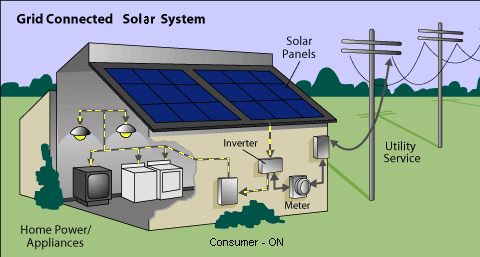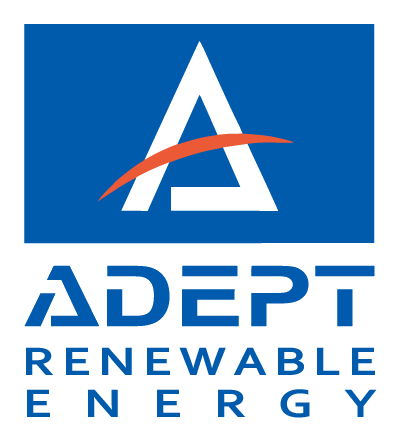PV stands for Photovoltaics; one of the main methods for capturing the sun's energy is through the use of photovoltaics. Photovoltaics (PV) utilize the sun's photons or light to create electricity. PV technologies rely on the photoelectric effect first described by French physicist Edmund Becquerel in 1839.
The photoelectric effect occurs when a beam of UV light, composed of photons (quantized packets of energy), strike one part of a pair of negatively charged metal plates. This causes electrons to be "liberated" from the negatively charged plate. These free electrons are then attracted to the other plate by electrostatic forces. This flowing of electrons is an electrical current. This electron flow can be gathered in the form of direct current (DC). This DC can then be inverted into alternating current (AC), which is the electrical power that is most commonly used in buildings.

PV modules last a long, long time. In decades-long tests, the fully developed technology of single- and polycrystalline modules has shown to degrade at fairly steady rates of 0.25%-0.5% per year.
Our solar panels come with a 25 year power output warranty (reflecting their manufacturers' faith in the durability of these products) and are expected to last at least twice that long. The power output warranty on the solar panels is provided by the manufacturer of the panels and states that at the end of the 20th year, the solar panel will still produce a minimum of 80% of their original power output. However, keep in mind that PV modules are seeing only six to eight hours of active use per day, so we may find that life spans of 40-50 years are normal.
Solar panels have a 25-year manufacturer's warranty, and inverters have a 10-year warranty. Performance efficiency for panels, after 25-years, is warranted to be at least 80% of the initial output. Batteries generally last 7-10 years if properly maintained. Adept Energy provides a 5-year guarantee on all installations. This includes annual inspections of your system(s) at no additional cost to you.
The panels are UL certified and tested to withstand hurricane force winds, and rainstorms. Falling stone, tree or hail do not damage the panels in most cases.
PV Panels are virtually maintenance free. Basically, you need to keep them clean. Most of the time, rain cleans them off.
a. All installation (roofing and electrical) work will be done by licensed professionals with proper county and state approvals. b. Equipment will carry UL certifications, where applicable.
All this does not add any risk to your home and thus home insurance in most of the cases does not get affected at all, although the system does contribute to an increase the home/property value.
Although you can take your solar electric system with you if you move, it usually is better to leave it on the original house because it increases the resale value of a home.
Adept Energy is one of the few companies that really makes it easy to monitor your system performance. When estimating what your system will produce we are conservative in our approach and use 20-year historical sun data from NREL (National Renewable Energy Laboratory). Your inverter has an LCD display that will provide you with a readout as to how your system is producing, which makes it simple to see your actual production.
We can also install a web-based tool that can be used to monitor the system real time. We will also provide you with a production estimate for your system and we encourage you to match what we estimate your system will produce versus the actual consumption.
Net-metering measures the difference between the electricity you buy from your utility and the electricity you produce with your solar energy system. Under net-metering, any excess electricity produced by your solar energy system spins your existing meter backwards, effectively storing the electricity until it is needed. Your meter than spins forward when your solar energy system is not producing all the electricity you are currently using. Your electric meter keeps track of this "net" difference as you generate electricity and take electricity from the utility grid.
Because solar energy is an intermittent resource you may not be using the power when it is generated, and net-metering allows you to receive full value for the electricity you produce without installing and investing in a battery storage system.
Solar electric systems are designed to withstand all weather conditions. Lightning, wind up to 80 miles per hour, and extreme temperatures are all things your solar system can handle. However, these conditions will temporarily reduce its energy production.
In fog, marine layer, or June gloom your system will still produce about 25-30% of normal. A steady rain cuts production but is great for cleaning your panels.
You are absolutely right that during the time immediately following a snowstorm when the panels are covered the system production will be minimal. However, we place solar systems in the exact spot where sunshine is greatest. The first area to melt will be where the solar panels are located. Plus, the panels are tilted with a surface made of tempered glass allowing snow to easily slide off.
Solar history: Alexandre Edmond Becquerellar . Born in Paris, Edmond Becquerel (1820-1891), a French physicist in 1839, is known for his studies in the solar spectrum, magnetism, electricity and optics. He is best known for his discovery and unraveling the key principle to solar energy cells, the photovoltaic effect. In the 1840s he found that these reactions could produce an electric current in both liquids and metals. The connection between light energy and chemical energy was seized upon by many scientists in the following years, and research has led to the development of the photoelectric cell Scientists made solar cells of selenium in the 1880s. And, modern PV technologies were developed at Bell Labs and RCA Labs in the mid 1950s.
The most basic solar energy system is what is known as a "Grid-Tie Only" system. There are no batteries. Excess electricity produced by the solar panels, will be directed back to the local utility grid, spinning your existing meter backwards in the process. You will receive credit for any power that you "sell" to the utility company. This is what is known as Net Metering.
If you are interested in a solar system that will continue to power your home during a blackout, we do sell battery-backed solar systems.
Yes, both off-grid and grid-tied systems use the same solar panels. However, to add batteries to a grid-tied system, you will need to replace the inverter with a special hybrid device.
For starters, any size solar system will make in impact on your yearly power consumption. The bigger the system, the bigger the impact. To figure out how much of an impact, find the total number of kilowatt-hours you used in the last 12 months. If an entire year's worth of bills are not available, annualize your average daily consumption. We have found the average home in the mid-Atlantic area to use about 9,600 KW hours a year. A 1-KW solar system, will generate up to 2,000 KW-hours in a year. Therefore, 1 KW will could provide over 20% of an average household's yearly power consumption.
In most situations, the PV panels can be easily removed and reinstalled. If the roof is a tar and gravel design, it may be possible to simply tilt the panels up and re-tar and gravel.
Yes, a solar panel does produce electricity even when it is not placed in bright sunlight. On a normal cloudy day there is always enough solar irradiance, by which the panel will produce electricity. However, the production of electricity is not as high as when the panels are placed in bright sunlight. So even on a cloudy day your panel will produce electricity.
Yes, we have several options for our customer. Talk with your Solar Consultant for more details on what Adept Energy has to offer.
Be honest here about your install times. Also, mention typical wait times for your city to approve. Transparency is best.
Adept Energy is a systems integrator in solar photovoltaic energy systems with the goal to provide clean, renewable solar energy at an affordable price. As a solar energy services company, we:
1. Manufacture photovoltaic (PV) solar modules:
Adept Energy has built its own state of the art PV modules manufacturing facility in India. Our modules are certified under IEC 61215, IEC 61701, EN 61730-1 / EN 61730-2, UL 1703, CEC, CE, FSEC, AS/NZS 5033, TUV.
2. Distribute photovoltaic modules:
Adept Energy has set up worldwide distribution centers in France, Belgium, Italy, India, Africa and USA. We have formed strategic alliances with partners in global locations for module and equipment supply and sales.
3. Install and service photovoltaic solar power systems:
Adept Energy is building its installation, integration and services business in the mid-Atlantic region of USA, serving Virginia, Maryland, and the District of Columbia. We help residential and commercial customers understand solar, apply for incentives, obtain permits, and get net-metering for their systems. Our service crews are licensed and highly experienced in their respective trades.
As a manufacturer of top quality CEC (California Energy Commission) rated solar modules in our own world-class ISO 9001-2008 certified PV Module manufacturing facility and in-house engineering, procurement and construction teams (EPC), Adept Energy is in its true sense is a vertical integrated turnkey solar solutions provider equipped to deliver solar energy on large scale at very competitive prices. Our vertical integration across the value chain enables us to achieve operational efficiencies leading to cost and time savings for our customers and ensures delivery of superior products at an unmatched value. We are a leading provider of turnkey EPC solutions for residential, commercial, and utility scale (MW) size power plants worldwide; Adept Energy provides all these (below) inclusive of price quoted per watt:
- Consultation
- Site-visits/assessments
- System design and engineering,
- All paperwork required with HOAs, Historic approvals to permitting
- All paperwork required for utility interconnection, state/FED incentives
- Installation/Integration( EPC) service and
- Maintenance for residential as well as commercial scale clients.
Yes, Adept Energy will provide you with the Best Service in the business if for any reason you have troubles with your Solar Systems.
